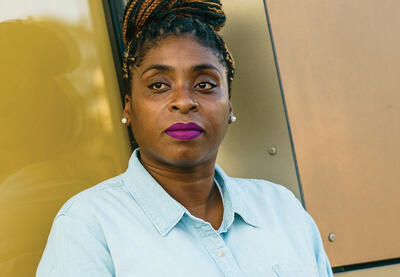“Like the dead-seeming, cold rocks, I have memories within that came out of the material that went to make me. Time and place have had their say. So you will have to know something about the time and place where I came from, in order that you may interpret the incidents and directions of my life.” —Zora Neale Hurston
Fifteen minutes north of downtown Orlando, Florida, is the quiet, unassuming town of Eatonville. Most people are familiar with Eatonville because of author and anthropologist Zora Neale Hurston. While Hurston is Eatonville’s most famous resident, the town itself is notable as the first Black-incorporated municipality in the United States. Joseph E. Clark founded Eatonville in 1887, 22 years after slavery ended in the U.S. With the establishment of the town, Black people finally found a place where, instead of just existing on the margins of a white town, they could live autonomously.
Having grown up in Eatonville, and being one of Clark’s descendants, for me Eatonville is not just a town; it’s the reason for my work. I host the podcast Belonging, because beyond the safety of Eatonville’s borders, Black and other people pushed to the margins have historically struggled with feelings of not belonging. I’ve stepped in to serve as a conduit for storytelling and listening, committed to giving space to those affected by bias, and to spark and share stories of transformation.
My role began as I was growing up, reveling in my father’s storytelling during family outings when he shared riveting tales of his childhood adventures as well as the sting of things family members faced during Jim Crow. But it was my mother’s story of her experience with school desegregation that struck a certain chord within me. In the 1960s, desegregation required my mother to leave her all-Black school in Eatonville to integrate a school in the nearby predominantly white town of Lockhart. Alabama Gov. George Wallace’s televised proclamation of “segregation now, segregation tomorrow, segregation forever” rang in my mother’s young ears and left her terrified to speak, fearful of the violent objections—the protests and the bombings—to school integration happening across the nation.
Being uprooted from safety and normalcy, from where her curiosity and intelligence were nurtured, and landing in a situation where she was silenced transformed my mother from a child who loved school and learning into a student who was afraid to ask questions in class. My mother knew she would be overlooked when she raised her hand and tried to participate. She was in foreign territory, and her goal was to survive—sitting silent and withdrawn was her means of enduring. She wanted, and she deserved, more from her education.
After talking with my mother about her traumatic experience, I reflected on my own feelings of otherness because of the lack of personal and cultural connections with my teachers. Then I realized my 12-year-old niece is also experiencing feelings of exclusion in her education. This feeling of not belonging has spanned at least three generations in my family. And I became determined to do something about it and created Belonging. With this podcast, I serve a national audience of educators and students to help end this kind of inheritance.
One of the first storytelling and listening experiences on Belonging is with a former colleague who reflects on her use of racist language with students in her school. We discuss the impact this had on her own and her students’ sense of identity and belonging, and the unlearning she had to do. Vulnerable sharing in the podcast sparks new equity commitments, which then inspire new podcast episodes. Our hope is that engaged professional learning communities thrive and create an increased sense of belonging with higher levels of success in schools and other communities of learning and work—because every person longs for safety, for the freedom to be themselves, and for community.
Eatonville was established as a refuge for the Black community. Zora Neale Hurston captured the essence of the town in her stories, giving the world a peek into the power of culture and kinship. On Belonging we use storytelling, too, to reckon with, reconcile and rebuild, working toward consciousness and equity in schools and communities of learning, harnessing the power of our stories to create pathways of consciousness and healing. This is my way of serving.
